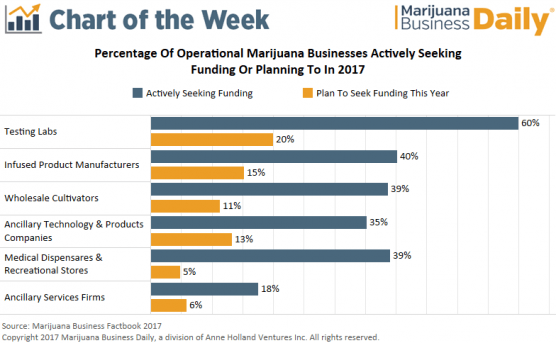By John Schroyer
Los Angeles may be on its way to becoming the epicenter of the cannabis industry, but many marijuana firms still feel persecuted.
Although L.A. voters overwhelmingly approved a ballot measure in March to establish cannabis business rules, companies still face police raids or other “harassment” from city agencies, sources told Marijuana Business Daily.
As a result, many marijuana operators have become reluctant to take part in negotiations over a new ordinance that will govern the city’s cannabis industry for fear they’ll be targeted by law enforcement, and others are considering relocating to more cannabis-friendly municipalities.
She said she’s had “lengthy conversations with many clients who are saying, ‘I don’t know if I even want to go through with this process.'”
The “process” is a licensing system that L.A.’s city council is crafting, but an early draft called for a “certificate of compliance” for businesses, not actual licenses.
Adam Spiker, the executive director of the Southern California Coalition (SCC), said L.A. is risking running off businesses with continued police actions and “harassment” against cannabis operators.
“There are cities all around L.A … and it’s going to be competitive … where municipalities are going to court this industry because they want the jobs and the tax revenue,” Spiker said.
“Our members are now going to those other cities because it’s like, ‘Here we go again,’ with the city of L.A. We’re back at the table (discussing MJ regulations), we get some traction, and then we see some of our members getting raided or getting harassed.”
Fear silencing businesses
Not every L.A. cannabis business has encountered problems – one trade association spokesman said he hasn’t heard of any raids this year – but some have encountered issues ranging from raids to court cases to violation notices from the city’s Building and Safety Department.
A prominent example is LAPD’s May raid on THC Design, a longtime grow operation. In addition, “three of (the SCC’s) top advisers had their facilities raided” in April, according to Ryan Jennemann, lead consultant for THC Design.
Multiple MJ businesses have been “shut down in the past couple of months,” Jennemann said. “They’re just too afraid to come out and say anything because … being politically active is one of the reasons they feel like they were targeted.”
Erik Hultstrom, founder of L.A.-based Cultivators Alliance, said he’s heard firsthand of raids on 10-plus businesses since March.
Raids don’t typically lead to charges, he added. “They’re pretty much just smash-and-grab and (authorities) kill the (electrical power) and then leave. Everything is seized. That’s the M.O.”
There also have been instances of marijuana businesses facing legal action by the city.
Greenhouse Herbal Center is among 576 MMJ businesses on a list of companies that are still facing criminal prosecution by L.A.’s city attorney.
The dispensary operated continuously from 2006 until June 12, when the storefront was forced to close under a plea agreement, GHC spokesman Hector Santa Cruz said.
The deal – which the dispensary agreed to in late May – stemmed from GHC missing a 2011 re-registration deadline because of an executive’s medical emergency. When GHC tried to file the paperwork a few days later, the company was told the deadline had passed.
The dispensary was then raided by police in November 2015, even though GHC officials said the company has obeyed the city’s evolving laws and paid roughly $1 million in city taxes.
“We haven’t done anything. We’ve played by the rules,” Santa Cruz said. “And still, they just want to squeeze us out.”
City officials respond
A spokeswoman for L.A. City Council President Herb Wesson noted in an email that – while Wesson has been “working with the cannabis industry to develop a framework for operating in Los Angeles” – the council has no purview over either the city attorney’s office or LAPD.
Lt. Stacy Spell of the LAPD’s Gangs and Narcotics Division said cannabis has moved far down the priority list for police, given the passage of pro-cannabis laws.
“We’re looking at this as a business model that California has accepted, so my message to most cops is accept it and make sure (cannabis companies are) doing business in a way that’s not going to be a threat to public safety,” he said. “Our folks are not going out and doing warrants (at marijuana businesses) unless they have a significant complaint.”
But many marijuana business owners don’t always grasp that one L.A. agency may be responsible for raids or legal action while another may be working to bring cannabis companies into the regulated market.
Those owners may look at L.A. as a bureaucratic monolith, which helps foster the image that the city is hostile toward the cannabis industry, Clark said.
What’s next
L.A.’s city council is working on a new regulatory system for the cannabis industry in line with voter-approved legislation and hopes to finalize it by the end of September. The new system is slated to take effect in January.
Until then, L.A. marijuana businesses continue to operate under the strict provisions of Proposition D. The law grants “limited immunity” from prosecution for up to 135 dispensaries and offers no protections for growers, edibles makers or other types of plant-touching businesses.
That means crackdowns are likely to continue against L.A. marijuana companies that flaunt the law.
The concern, said Hultstrom, is the raids and legal actions also affect law-abiding cannabis businesses – without explanation.
“A lot of times, (MJ business) attorneys don’t know what triggers them,” Hultstrom said. “Everyone knows it can happen at any time to anybody in the space.”
John Schroyer can be reached at johns@mjbizdaily.com




